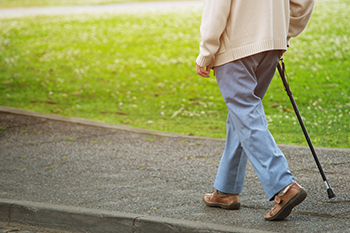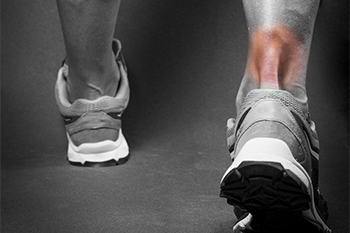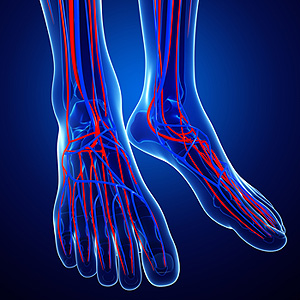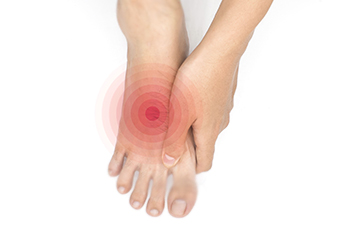Connect With Us
Blog
Items filtered by date: July 2023
Good Foot Care Habits Are Crucial for Seniors

Many elderly people who have chronic foot pain assume it is from the aging process. Any level of foot pain is considered to be abnormal, and it is beneficial to explore reasons why current foot pain exists. Having foot pain may be a gateway toward health issues such as diabetes, arthritis, or poor circulation, and addressing it as soon as possible may help to prevent these types of conditions from becoming worse. Good foot care habits for seniors can include trimming the toenails straight across instead of in a curved fashion, which may help to prevent ingrown toenails from developing. Additionally, after the feet are washed and dried daily, the soles can be inspected for any cuts or scrapes that have developed. It is beneficial to be under the care of a podiatrist during these years who can advise you on proper measures for implementing good foot care. It is important to choose shoes that have ample room for the toes to move freely in, with enough room to pinch the material on the sides or top of the shoe. If you have specific concerns about foot care for elderly people, it is suggested that you contact a podiatrist who can provide you with expert knowledge.
Proper foot care is something many older adults forget to consider. If you have any concerns about your feet and ankles, contact Emil Babayev, DPM from New York. Our doctor can provide the care you need to keep you pain-free and on your feet.
The Elderly and Their Feet
As we age we start to notice many changes in our body, but the elder population may not notice them right away. Medical conditions may prevent the elderly to take notice of their foot health right away. Poor vision is a lead contributor to not taking action for the elderly.
Common Conditions
- Neuropathy – can reduce feeling in the feet and can hide many life-threatening medical conditions.
- Reduced flexibility – prevents the ability of proper toenail trimming, and foot cleaning. If left untreated, it may lead to further medical issues.
- Foot sores – amongst the older population can be serious before they are discovered. Some of the problematic conditions they may face are:
- Gouging toenails affecting nearby toe
- Shoes that don’t fit properly
- Pressure sores
- Loss of circulation in legs & feet
- Edema & swelling of feet and ankles
Susceptible Infections
Diabetes and poor circulation can cause general loss of sensitivity over the years, turning a simple cut into a serious issue.
If you have any questions please feel free to contact our offices located in Midwood and Kensington in Brooklyn, NY . We offer the newest diagnostic and treatment technologies for all your foot and ankle needs.
Arthritis Can Cause Pain in the Feet and Ankles
Heel Pain and Achilles Tendon Injuries

The Achilles tendon connects the calf muscles to the heels, and despite it being strong, it is not especially flexible. This tendon has a small amount of room to move and an injury can cause it to stretch beyond its normal limits. The noticeable symptoms when the Achilles tendon stretches too far are inflammation, irritation, heel pain, and it is often difficult to walk. People who run and increase speed and distance too quickly may be prone to incurring an Achilles tendon injury, and it is beneficial to perform specific stretches to loosen up this tendon before starting a run. This type of injury may also happen from training in cold weather, having poor running form, or having flat feet. A patient may often seek advice from a podiatrist to find relief from the severe pain this type of injury can cause. An X-ray can be performed that can rule out a fractured bone. If you have heel pain, it is suggested that you visit a podiatrist who can successfully treat an Achilles tendon injury.
Achilles tendon injuries need immediate attention to avoid future complications. If you have any concerns, contact Emil Babayev, DPM of New York. Our doctor can provide the care you need to keep you pain-free and on your feet.
What Is the Achilles Tendon?
The Achilles tendon is a tendon that connects the lower leg muscles and calf to the heel of the foot. It is the strongest tendon in the human body and is essential for making movement possible. Because this tendon is such an integral part of the body, any injuries to it can create immense difficulties and should immediately be presented to a doctor.
What Are the Symptoms of an Achilles Tendon Injury?
There are various types of injuries that can affect the Achilles tendon. The two most common injuries are Achilles tendinitis and ruptures of the tendon.
Achilles Tendinitis Symptoms
- Inflammation
- Dull to severe pain
- Increased blood flow to the tendon
- Thickening of the tendon
Rupture Symptoms
- Extreme pain and swelling in the foot
- Total immobility
Treatment and Prevention
Achilles tendon injuries are diagnosed by a thorough physical evaluation, which can include an MRI. Treatment involves rest, physical therapy, and in some cases, surgery. However, various preventative measures can be taken to avoid these injuries, such as:
- Thorough stretching of the tendon before and after exercise
- Strengthening exercises like calf raises, squats, leg curls, leg extensions, leg raises, lunges, and leg presses
If you have any questions please feel free to contact our offices located in Midwood and Kensington in Brooklyn, NY . We offer the newest diagnostic tools and technology to treat your foot and ankle needs.
How Can I Relieve Symptoms From Poor Circulation?

Common symptoms of poor circulation are tingling sensations in the feet after sitting for long periods or if exposed to cold elements. There may be existing medical conditions that can cause poor circulation. High blood pressure can be a common reason, as it could represent limited blood flow to the organs. People who smoke may be prone to developing poor circulation, and the effects are often felt in the lower legs and feet. Poor circulation may also happen from having endured a foot injury, which may constrict blood flow. It is important for patients who lead a sedentary lifestyle to move around as much as possible. Engaging in a gentle exercise program is an effective way to accomplish this, and can provide adequate circulation to the body. If you would like additional knowledge about how poor circulation can affect the feet, it is suggested that you confer with a podiatrist.
Poor circulation is a serious condition and needs immediate medical attention. If you have any concerns with poor circulation in your feet contact Emil Babayev, DPM of New York. Our doctor will treat your foot and ankle needs.
Poor Circulation in the Feet
Poor blood circulation in the feet and legs is can be caused by peripheral artery disease (PAD), which is the result of a buildup of plaque in the arteries.
Plaque buildup or atherosclerosis results from excess calcium and cholesterol in the bloodstream. This can restrict the amount of blood which can flow through the arteries. Poor blood circulation in the feet and legs are sometimes caused by inflammation in the blood vessels, known as vasculitis.
Causes
Lack of oxygen and oxygen from poor blood circulation restricts muscle growth and development. It can also cause:
- Muscle pain, stiffness, or weakness
- Numbness or cramping in the legs
- Skin discoloration
- Slower nail & hair growth
- Erectile dysfunction
Those who have diabetes or smoke are at greatest risk for poor circulation, as are those who are over 50. If you have poor circulation in the feet and legs it may be caused by PAD and is important to make changes to your lifestyle in order to reduce risk of getting a heart attack or stroke. Exercise and maintaining a healthy lifestyle will dramatically improve conditions.
As always, see a podiatrist as he or she will assist in finding a regimen that suits you. A podiatrist can also prescribe you any needed medication.
If you have any questions please feel free to contact our offices located in Midwood and Kensington in Brooklyn, NY . We offer the newest diagnostic and treatment technologies for all your foot and ankle needs.
Refrain from Smoking and Walking Barefoot if Diabetic

Diabetes is a serious medical condition that can affect the nerves in the feet. Many diabetic patients develop neuropathy, which is the inability to feel cuts and scrapes that have developed on the feet. This can lead to getting infections and foot ulcers, both of which need immediate medical attention. Proper diabetic foot care begins with washing and drying the feet daily, followed by inspecting the soles of the feet for any abrasions. Many people choose to use a mirror to do this, or to ask a family member or caregiver to help them accomplish this. Additionally, it is beneficial for the toenails to be trimmed weekly. It is wise to stop smoking, if applicable, which may help to increase blood flow to the feet. Many diabetic patients know the importance of wearing shoes at all times, which can help to prevent stepping on objects that can damage the skin. If you have diabetes, it is strongly suggested that you are under the care of a podiatrist who can help you to manage this condition.
Diabetic foot care is important in preventing foot ailments such as ulcers. If you are suffering from diabetes or have any other concerns about your feet, contact Emil Babayev, DPM from New York. Our doctor can provide the care you need to keep you pain-free and on your feet.
Diabetic Foot Care
Diabetes affects millions of people every year. The condition can damage blood vessels in many parts of the body, especially the feet. Because of this, taking care of your feet is essential if you have diabetes, and having a podiatrist help monitor your foot health is highly recommended.
The Importance of Caring for Your Feet
- Routinely inspect your feet for bruises or sores.
- Wear socks that fit your feet comfortably.
- Wear comfortable shoes that provide adequate support.
Patients with diabetes should have their doctor monitor their blood levels, as blood sugar levels play such a huge role in diabetic care. Monitoring these levels on a regular basis is highly advised.
It is always best to inform your healthcare professional of any concerns you may have regarding your feet, especially for diabetic patients. Early treatment and routine foot examinations are keys to maintaining proper health, especially because severe complications can arise if proper treatment is not applied.
If you have any questions please feel free to contact our offices located in Midwood and Kensington in Brooklyn, NY . We offer the newest diagnostic and treatment technologies for all your foot and ankle needs.

